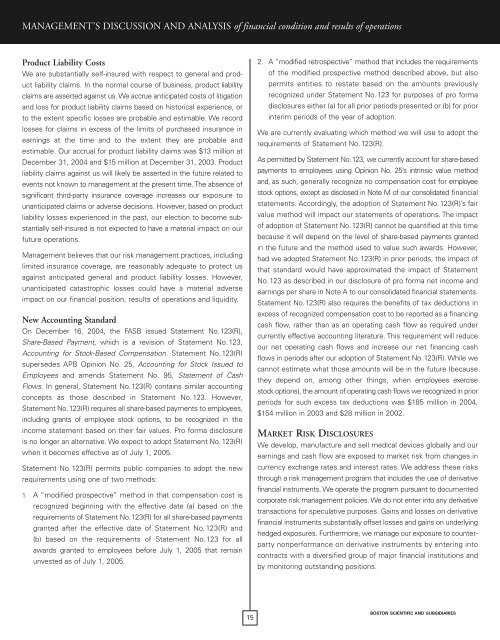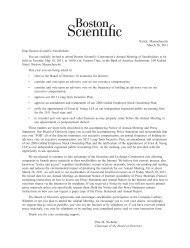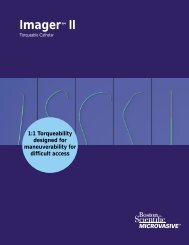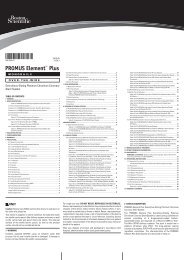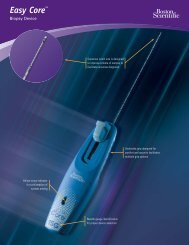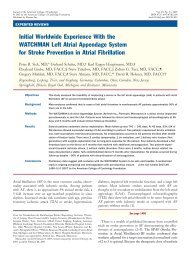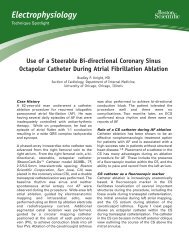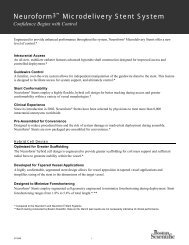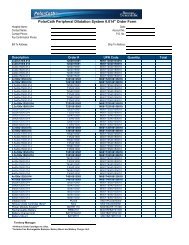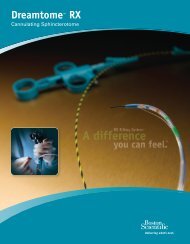CONSOLIDATED FINANCIAL STATEMENTS - Boston Scientific
CONSOLIDATED FINANCIAL STATEMENTS - Boston Scientific
CONSOLIDATED FINANCIAL STATEMENTS - Boston Scientific
You also want an ePaper? Increase the reach of your titles
YUMPU automatically turns print PDFs into web optimized ePapers that Google loves.
MANAGEMENT’S DISCUSSION AND ANALYSIS of financial condition and results of operations<br />
Product Liability Costs<br />
We are substantially self-insured with respect to general and product<br />
liability claims. In the normal course of business, product liability<br />
claims are asserted against us. We accrue anticipated costs of litigation<br />
and loss for product liability claims based on historical experience, or<br />
to the extent specific losses are probable and estimable. We record<br />
losses for claims in excess of the limits of purchased insurance in<br />
earnings at the time and to the extent they are probable and<br />
estimable. Our accrual for product liability claims was $13 million at<br />
December 31, 2004 and $15 million at December 31, 2003. Product<br />
liability claims against us will likely be asserted in the future related to<br />
events not known to management at the present time. The absence of<br />
significant third-party insurance coverage increases our exposure to<br />
unanticipated claims or adverse decisions. However, based on product<br />
liability losses experienced in the past, our election to become substantially<br />
self-insured is not expected to have a material impact on our<br />
future operations.<br />
Management believes that our risk management practices, including<br />
limited insurance coverage, are reasonably adequate to protect us<br />
against anticipated general and product liability losses. However,<br />
unanticipated catastrophic losses could have a material adverse<br />
impact on our financial position, results of operations and liquidity.<br />
New Accounting Standard<br />
On December 16, 2004, the FASB issued Statement No.123(R),<br />
Share-Based Payment, which is a revision of Statement No.123,<br />
Accounting for Stock-Based Compensation. Statement No.123(R)<br />
supersedes APB Opinion No. 25, Accounting for Stock Issued to<br />
Employees and amends Statement No. 95, Statement of Cash<br />
Flows. In general, Statement No.123(R) contains similar accounting<br />
concepts as those described in Statement No.123. However,<br />
Statement No.123(R) requires all share-based payments to employees,<br />
including grants of employee stock options, to be recognized in the<br />
income statement based on their fair values. Pro forma disclosure<br />
is no longer an alternative. We expect to adopt Statement No.123(R)<br />
when it becomes effective as of July 1, 2005.<br />
Statement No.123(R) permits public companies to adopt the new<br />
requirements using one of two methods:<br />
1. A “modified prospective” method in that compensation cost is<br />
recognized beginning with the effective date (a) based on the<br />
requirements of Statement No.123(R) for all share-based payments<br />
granted after the effective date of Statement No.123(R) and<br />
(b) based on the requirements of Statement No.123 for all<br />
awards granted to employees before July 1, 2005 that remain<br />
unvested as of July 1, 2005.<br />
15<br />
2. A “modified retrospective” method that includes the requirements<br />
of the modified prospective method described above, but also<br />
permits entities to restate based on the amounts previously<br />
recognized under Statement No.123 for purposes of pro forma<br />
disclosures either (a) for all prior periods presented or (b) for prior<br />
interim periods of the year of adoption.<br />
We are currently evaluating which method we will use to adopt the<br />
requirements of Statement No.123(R).<br />
As permitted by Statement No.123, we currently account for share-based<br />
payments to employees using Opinion No. 25’s intrinsic value method<br />
and, as such, generally recognize no compensation cost for employee<br />
stock options, except as disclosed in Note M of our consolidated financial<br />
statements. Accordingly, the adoption of Statement No.123(R)’s fair<br />
value method will impact our statements of operations. The impact<br />
of adoption of Statement No.123(R) cannot be quantified at this time<br />
because it will depend on the level of share-based payments granted<br />
in the future and the method used to value such awards. However,<br />
had we adopted Statement No.123(R) in prior periods, the impact of<br />
that standard would have approximated the impact of Statement<br />
No.123 as described in our disclosure of pro forma net income and<br />
earnings per share in Note A to our consolidated financial statements.<br />
Statement No.123(R) also requires the benefits of tax deductions in<br />
excess of recognized compensation cost to be reported as a financing<br />
cash flow, rather than as an operating cash flow as required under<br />
currently effective accounting literature. This requirement will reduce<br />
our net operating cash flows and increase our net financing cash<br />
flows in periods after our adoption of Statement No.123(R). While we<br />
cannot estimate what those amounts will be in the future (because<br />
they depend on, among other things, when employees exercise<br />
stock options), the amount of operating cash flows we recognized in prior<br />
periods for such excess tax deductions was $185 million in 2004,<br />
$154 million in 2003 and $28 million in 2002.<br />
MARKET RISK DISCLOSURES<br />
We develop, manufacture and sell medical devices globally and our<br />
earnings and cash flow are exposed to market risk from changes in<br />
currency exchange rates and interest rates. We address these risks<br />
through a risk management program that includes the use of derivative<br />
financial instruments. We operate the program pursuant to documented<br />
corporate risk management policies. We do not enter into any derivative<br />
transactions for speculative purposes. Gains and losses on derivative<br />
financial instruments substantially offset losses and gains on underlying<br />
hedged exposures. Furthermore, we manage our exposure to counterparty<br />
nonperformance on derivative instruments by entering into<br />
contracts with a diversified group of major financial institutions and<br />
by monitoring outstanding positions.<br />
BOSTON SCIENTIFIC AND SUBSIDIARIES


